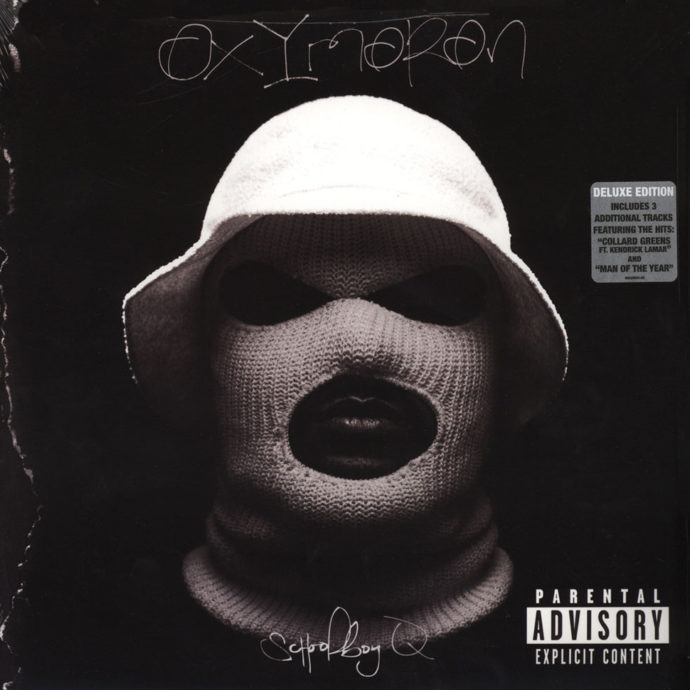By Randy Wagstaff
In terms of a lead-in for Oxymoron, Los Angeles label Top Dawg Entertainment (Kendrick Lamar, ScHoolboy Q, Jay Rock, etc.) could not have done much better than Kendrick Lamar’s good kid, m.A.A.d city. The hip-hop world was fired up, expecting another carefully constructed masterpiece, and ScHoolboy Q spent a good portion of 2013 fanning the flames by announcing that his album was going to be better than Lamar’s. The danger of expectations then came in equating those predictions; Q’s confidence about Oxymoron was sincere, but he sincerely did not care to aim for perfection (consider the title of the album alone). Nothing about Q suggests the punctilious craft of his label-mate and if follow-up expectations were not going to be met, then it was going to be because a mistake was made in expecting more of the same. Q’s awareness of this is more than likely, and that’s probably why, when you first sit down to listen to Oxymoron, it immediately tells you what kind of album it is going to be: “gangsta, gangsta, gangsta, gangsta, gangsta, gangsta.”
Q’s daughter, the same one rocking bucket-hat on the main album cover, opens up the record with a felicitous statement: “Fuck rap, my daddy a gangsta.” Thematically, Oxymoron is about the connection between those two worlds: the hood and the home; drugs and fatherhood. Nowhere is that more obvious than on “Prescription/Oxymoron,” which narrativizes Q’s experiences in the drug world, first as a user, then as a pusher. As an addict, Q is isolated, inaccessible: “My mommy call, I hit ignore/My daughter calls, I press ignore,” then later “My phone ring, ring and ring and ring/If you ain’t selling drugs, then I don’t hear a thing.” With his daughter pleading for his attention in the background, Q’s nihilism is particularly affecting. Then, resigned, she says, “OK, I love you daddy.” The beat is flipped. A piano. A wake-up call into the oxymoron, which, it becomes painfully clear, is Q’s necessary relationship with drugs as a support system for his relationship to his family (“80s, get these off new shoes for my baby”). The second half of the song features Q’s trademark combination of a bouncy, modern beat below hard hitting gangster-rap lyrics. The album’s production is a showcase of dreamy melodies and marching snares, like the ghostly background of “Hell of a Night,” which practically cries out for a 12-minute posse cut as it loops around and around. On “What They Want,” Q pulls 2 Chainz into his world, making for one of the best features on an album filled with memorable contributions. Tity Boi is, as always, his charming self (“She want Versace belt like it’s a mistletoe”), but he also briefly switches up his flow near the end of his feature to add to the album’s lean aesthetic (“Amigos say ‘Que pasa with the pesos?’/Promethazine codeine, caseloads”).
The features are all unprecedentedly brilliant, from Kendrick Lamar’s ether on what is already an old favourite in “Collard Greens,” to Jay Rock’s now annual tradition of stealing a song from his label-mates with just a few schemes (he is featured on “Los Awesome”: “Handle bars, ever swing, guns blow like dusty winds”), to BJ the Chicago Kid channeling Nate Dogg on “Studio,” to two perfect verses from Kurupt and Raekwon (“The Purge” and “Blind Threats,” respectively). The singles are a celebration, not of the kind that the music video for “Man of the Year” would suggest, but a much more introspective one. On “Break the Bank,” the celebration is as much about the past (“Good weed, I hit that, crack rock, I sold that/Oxy, I hid that, right by my nutsack”) as it is about the future, though you would be hard-pressed to find Q having more fun than he does on the sing-song chorus, taunting his contemporaries like an actual schoolboy might, with a ridiculous, “La-da-di-do, la-di-da-di-da-di-do.”
Oxymoron is not a perfect album, but it is remarkable at every turn. It manages to be a commemoration of past and future, both inwardly (Q’s relationships with drugs and family as a backdrop to his success) and outwardly (the album fuses an undeniably classic West Coast grit — celebrated by featuring both Kurupt and Tyler, The Creator on “The Purge” — with a melodic, contemporary sound). Comparisons to Lamar’s GKMC are unfortunately unavoidable because the two share large parts of their come-up stories and because the thirst Kendrick’s brilliant debut created still dominates the hip-hop landscape. But if mainstream rap is trying to quench that with a helping of ScHoolboy Q, that will be a little too much like taking a canteen filled with lean into the desert, and about as successful, too. ScHoolboy Q is not, and probably never will be, focused on dominating the charts. (Originally, he only planned for Oxymoron to have one radio-friendly single.) Grantland’s Amos Barshad explained it best in a recent profile of Q: “Kendrick is meticulous, his every move — sometimes even mid–emotional meltdown — a carefully calculated strike. Q? Q’s just out here crushing up pills with the butt of his phone, flipping over cars, getting druggy and fuzzy and weird. In the casual extremes of his abandon, he is thrilling.” Thrilling. Like artist, like album.
Rating: 8.5/10
MP3: Schoolboy Q “Break The Bank”
Buy: iTunes or Amazon

